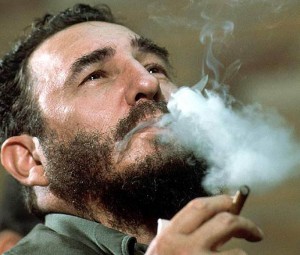Tabaquismo and Smoking Culture in Cuba
May 4, 2012 by admin
On our last day in Havana, my research group visited several pharmacies and polyclinics to do interviews for our project on Cuba’s healthcare system. We wanted to ask questions about the healthcare problems Cuba faced during the Special Period and about the government’s current healthcare priorities. While walking through the hospital, however, I was surprised to see many printed signs saying “departamento libre de humo,” or “smoke free department.” Even in a major tobacco-growing country where smoking seemed to be permitted almost everywhere, indoors and out, it seemed strange that signs would be needed to remind people not to smoke in a hospital. Later, during our interviews with some of the hospital staff, we were talking about Cuba’s focus on preventative healthcare, in which an emphasis is placed on identifying and limiting causes of illness. I asked one of the secretaries we were talking to whether the signs in the hospital were part of a larger effort to reduce smoking in Cuba. I was shocked when she replied that smoking is not even an issue that Cuban doctors really consider. Furthermore, she said, the ban on smoking in hospitals had only been put in effect a few years ago.
Coming from the U.S., where smoking is heavily stigmatized and has been considered a major public health concern for several decades, the relative lack of attention to the issue in Cuba was striking and made me want to find out more about the place of tobacco in Cuban society. When I looked more deeply into the Cuban government’s stance on smoking, it turned to be a bit more complex than the person I talked to made it seem. First of all, there has been a government effort to reduce smoking, which led in 2005 to a law that banned smoking in all workplaces and limited the locations in which tobacco products could be sold.[1] Early reports on the effects of the law, however, noted that most Cubans were either unaware of it or simply disregarded it completely, which would explain the conversation I had about it.
Cuba’s internet encyclopedia, EcuRed.cu, contains a fairly detailed article on “Tabaquismo” in Cuba, with a fairly detailed analysis of the difficulties Cuba faces in terms of tobacco use. It notes that while rates of smoking have declined steadily over several decades, smoking of both cigarettes and cigars is heavily engrained in Cuban culture. In 2001, the nationwide prevalence of tobacco use was 31%, with men smoking significantly more than women. One of the major problems Cuba faces in any effort to reduce tobacco use is its status as a major tobacco-growing country and its fame for producing some of the best cigars in the world. Any attempts to limit smoking therefore have challenge one of the few industries outside of tourism that the Cuban government can rely on to provide hard currency from exports and jobs for Cuban workers.
The crucial link between the Cuban government and tobacco production becomes especially evident during the yearly cigar festival Cuba hosts in Havana. The “Festival del Habano” is one of the world’s largest cigar industry trade shows and draws aficionados, especially the super-wealthy, to Havana for what is basically a massive celebration of smoking culture. The most important event is a $500 a ticket dinner and auction hosted by Habanos, the Cuban government entity in charge of cigar exports.[2] It’s not only selling tobacco that makes money for Cuba, though – cigars are part of the image that sells Cuba as an exotic tourist destination. And let’s not forget the fact that the young Fidel Castro was almost always photographed with cigar in hand, though he supposedly stopped smoking in the mid-1980s. In terms of smoking prevention, this creates a massive conflict of interest for Cuba because it is unlikely that a government that makes so much money from tobacco would be seriously willing to limit smoking.
This indeed seems to be the case. While we were in Cuba, I did not notice a single public space, outside of the hospital, where smoking was explicitly prohibited. There seemed to be Cubans smoking at every turn, in bars, restaurants and hotels and our guide Joel would never miss the opportunity to light up as soon as we stepped off the bus. In contrast to the ubiquitous anti-smoking rhetoric in the U.S., there’s something quaint but refreshing about the easy-going attitude Cubans have towards tobacco. Nonetheless, this attitude represents a major challenge for the healthcare system in Cuba, which would undoubtedly save many lives and a great deal of money if smoking were less prevalent. It seems unlikely, however, that the Cuban government will seriously attempt to change perceptions of tobacco use at any point in the near future. It is instead content to have fairly strong anti-smoking policies on paper without actually enforcing them.
Leave a Reply
You must be logged in to post a comment.


